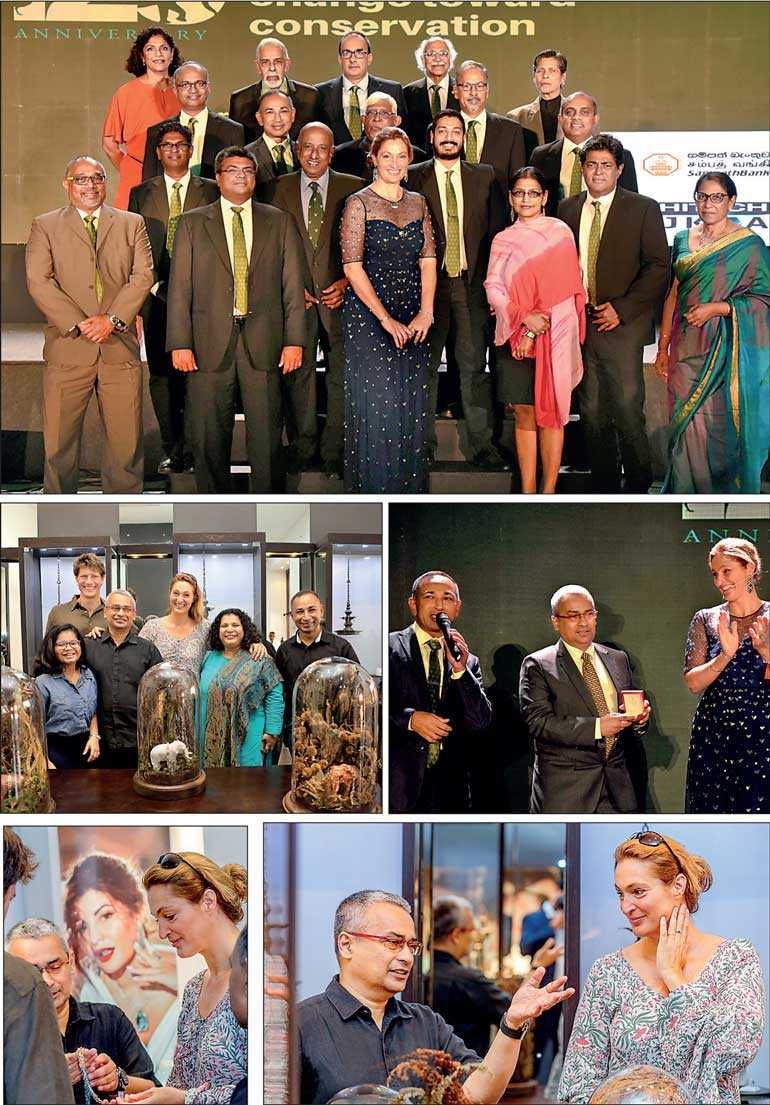Thursday Feb 19, 2026
Thursday Feb 19, 2026
Friday, 29 November 2019 00:00 - - {{hitsCtrl.values.hits}}

This year marked the 125th anniversary of the Wildlife and Nature Protection Society (WNPS), Sri Lanka’s premier civil organisation promoting the protection of flora and fauna in the island. Their  invaluable contributions over the last century, made towards the conservation of wildlife, as well as the human-elephant conflict in Sri Lanka are to get some much-needed international exposure with the arrival of Kenyan wildlife conservationist and television presenter Saba Douglas-Hamilton in Sri Lanka.
invaluable contributions over the last century, made towards the conservation of wildlife, as well as the human-elephant conflict in Sri Lanka are to get some much-needed international exposure with the arrival of Kenyan wildlife conservationist and television presenter Saba Douglas-Hamilton in Sri Lanka.
The WNPS was established in 1894, growing over the years to become the most active wildlife and nature conservation society in Sri Lanka by the 1970s. The WNPS is the third-oldest society of its kind in the world and has played a key role in driving policy implementation that made Yala and Wilpattu protected forest reserves, in addition to the vast amount of conservation work carried out over the years.
Born in the Great Rift Valley in Kenya, Saba Douglas-Hamilton is a naturalist through and through. Having been raised in the African bush country, she was able to gain first-hand knowledge on the natural environment around her and the elephants that lived in it. Her first job was with ‘Save the Rhino’ Trust in Namibia, after which she joined her father’s charity ‘Save the Elephants’ (STE) as Chief Operations Officer, to help build up their research centre in the Samburu National Reserve, located in north Kenya. It was Saba’s work with STE that drew the attention of BBC to her capabilities and soon thereafter, she began her life as a TV presenter and producer of wildlife documentaries.
CJS’ role as a partner and sponsor for the WNPS’ 125th anniversary celebrations is no random occurrence. For several years now, CJS has taken it upon themselves as a brand, to make a positive impact on the critical issue of human-elephant coexistence. In 2016, the brand was instrumental in getting Saba Douglas-Hamilton to speak at the Galle Literary Festival; creating greater awareness on the need for elephant conservation in Sri Lanka.
CJS also partnered with SLWCS to launch an elephant-friendly bus service in Wasgamuwa that transported children to school and back through an elephant corridor; exemplifying the possibility for co-existence and peace between man and elephant. With the launch of the ‘Unforgettable’ campaign, CJS took a progressive step towards making a bigger impact on the topic of elephant conservation in partnering with the SLWCS for the Orange Elephant Project.
By mobilising local communities to plant oranges as an alternative cash crop to elevate them socio-economically, the initiative helped develop a sustainable solution to reduce human-elephant conflicts, while also contributing to alleviate rural poverty and support the long-term conservation of the endangered Sri Lankan elephant.
Saba’s visit to Sri Lanka was largely motivated by her passion for our elephants as well as her interest in the different initiatives being taken to mitigate the prevailing human-elephant conflict. In celebrating her visit to Sri Lanka and the special visit she made to the CJS Dutch Hospital store. Saba Douglas-Hamilton was presented with a unique elephant pendant along with the first work in a limited-edition range of pendants numbering just 125 pieces; created to commemorate the 125 years of the WNPS. All proceeds from the sale of these special pendants will go to the WNPS for their work on conservation of Sri Lanka’s precious flora and fauna.
CJS’ latest collaboration with WNPS will be to drive a new innovation that will reduce adverse interactions between elephants and humans in Sri Lanka. CJS CEO Akram Cassim, WNPS President Sriyan De S. Wijeratne along with Saba Douglas Hamilton, Frank Pope, and other members of WNPS visited Uda Walawe to gift the newly introduced LED Light Repelling System (LRS) to farmers. The LRS serves to repel elephants away from human habitats by using flickering LED lights that temporarily disorient them, thus conditioning them to avoid the area in the future.
CJS will contribute to fund two of the four LRS projects with WNPS. This new initiative built on the adoption of the LED LRS; although experimental, will no doubt prove to be a critical step taken in the direction of arriving at an eventual working solution for the human-elephant conflict and as pledged when ‘Unforgettable’ launched, CJS will continue to strengthen and support initiatives that are dedicated to the cause.